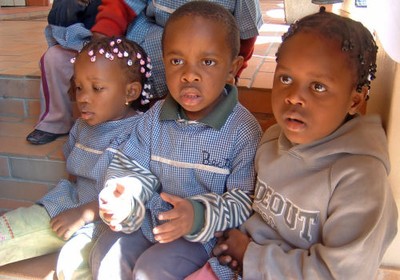Helping children in Lubango
 SOS Children's Village Lubango
SOS Children's Village Lubango
Lubango is the capital of the Huila province and lies about 1,000 kilometres south of Luanda, the Angolan capital.
The SOS Children's Village is situated approx. three kilometres outside of Lubango on a 19 hectares plot. The region is quite hilly with many small rocky outcrops; it is fertile with abundant water and is therefore mainly used for agricultural purposes.
Overall the SOS Children's Village is very well located, as the area provides great opportunities for the children's personal development. On 31 March 1998, the SOS Children's Village in Lubango was officially opened.
SOS Children's Village Lubango comprises twelve family houses, an administration and service area, a sports field and houses for the village director and the SOS aunts (who support the SOS mothers and take care of the children when the mothers are on leave). Up to 120 children can find a new home there.
Other SOS Projects in Lubango
The adjoining SOS Nursery has a capacity for up to 125 children and consists of five group rooms, a kitchen and a playground. Primary school education can be offered to up to 680 students at the SOS School. It comprises eighteen class rooms, three rooms for vocational training and a sports field.
At the SOS Medical Centre, more than 500 patients receive treatment per month.
The SOS Vocational Training Centre offers training courses in agriculture, and dressmaking, as well as a basic literacy programme for needy children from the community.
The SOS Youth Home accommodates up to 24 youths during the time of their vocational training or education and gives them a chance to prepare for an independent life under the guidance of their youth leaders. The main aim of the family strengthening programme is to help children at risk of losing their natural family environment by strengthening their families' ability to care for them. This includes educational scholarships, provision of school material and school uniforms, medical support and promotion of income-generating activities. Moreover, a local school and an orphanage receive material support through the family strengthening programme.
Background to Lubango
In 1882 approximately one thousand of Portuguese settlers came from the island of Madeira to the area of current-day Lubango, Angola. These Portuguese farmers successfully developed the whole region and founded the settlement. The city, originally established in 1885 to serve colonists from the Madeira Islands, lies at an elevation of 1,760 metres in a valley of the Huíla Plateau and was surrounded by a scenic park spreading up the mountain slopes.

 Return to Schools Wikipedia Home page…
Return to Schools Wikipedia Home page…
